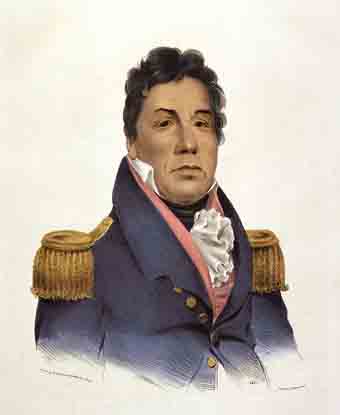For the Choctaws, involvement in the War of 1812 began in 1811. During that year, a delegation from the Shawnee Tribe visited Choctaw country. The Shawnee were a former enemy that had raided Choctaw country years before, but Tecumseh wished to convince the Choctaw to join a Native American confederacy to check the continued expansion of the United States into tribally-held lands.

Mississippi Department of Archives and History
Traveling from settlement to settlement, Tecumseh gave impassioned speeches about Anglo-Americans taking land and marginalizing Native people. He urged Choctaw people not to participate in inter-tribal wars, but rather to join the confederacy and fight on the side of Britain in the upcoming war.
Pushmataha, the most influential Choctaw chief at the time, traveled to many of these talks. Speaking after Tecumseh, he gave counterarguments to Tecumseh’s proposal. Pushmataha took the position that the United States was an ally of the Choctaw people and that if the Choctaws attacked American settlements, the Choctaw Nation would be destroyed. At each meeting, the Choctaw people sided with the words of Pushmataha. After speaking at a number of Choctaw villages without success, the Shawnee were eventually ordered by a committee of Choctaw Chiefs to leave the Choctaw Nation.
In the summer of 1813, a war council was held between pro-British Muscogee Red Stick leaders who agreed with Tecumseh’s vision and a number of Choctaw chiefs, including Pushmataha, Moshulitubbee, and Yowannee Mingo. The Red Stick leaders sought the Choctaw people as their ally in war against the U.S. Pushmataha spoke for two days at the council, urging peace. The council ended with the Choctaws still in favor of peace, and the Red Sticks still in favor of war. Tension turned to conflict. Red Stick leaders sent notice to the Choctaw village of Fvkitchimponta to abandon their town or be considered enemies. The Red Sticks, armed by the British, attacked American positions, initially with great success.
Pushmataha approached U.S general Flournoy offering to form a company of Choctaw warriors to fight for the United States against the Red Sticks. He reasoned that with war all around them, young Choctaw men would end up fighting for one side or the other, and he wanted them fighting for the United States. Initially, Pushmataha’s offer was refused, but it was later accepted. Around this time, two of Pushmataha’s nephews were murdered by U.S. citizens who saw nothing but the color of their skin. The murders cooled Pushmataha’s fervor for the U.S. somewhat, but he never dropped his support. Choctaw warriors formed companies both independently and under US military command, and fought against Red Stick forces on multiple campaigns in the Black Warrior valley, on Burnt Corn Creek, in the aftermath of the Battle of Holy Ground, and in the Alabama Heights region.
In August 1814, Andrew Jackson wrote a letter requesting help from Choctaw warriors in his upcoming campaign against British forces in the Southeast. For Choctaws, this was a difficult request. The tribe had missed out on the fall hunt in the previous year and was running low on food. Accommodating this request would likely mean missing the hunt again. Nonetheless, 795 Choctaws, including Pushmataha, reported to Fort Montgomery and were mustered in as regular troops. In and around Pensacola, they fought in the last skirmishes of the Creek War, and would later continue with Jackson to New Orleans.
After the Red Sticks were subdued, the U.S., ignoring the fact that some Muscogee communities had fought against the Red Sticks in the war, demanded that Muscogee communities as a whole cede more than 21 million acres of land. This was a shadow of things to come. In 1830, Andrew Jackson, who had called on and received Choctaw aid when he needed it most, signed the Indian Removal Act. The same year, he sent government agents into Choctaw country, who threatened the Choctaw people with unprovoked military action if they did not agree to relinquish their ancient homeland.
Last updated: August 14, 2017
